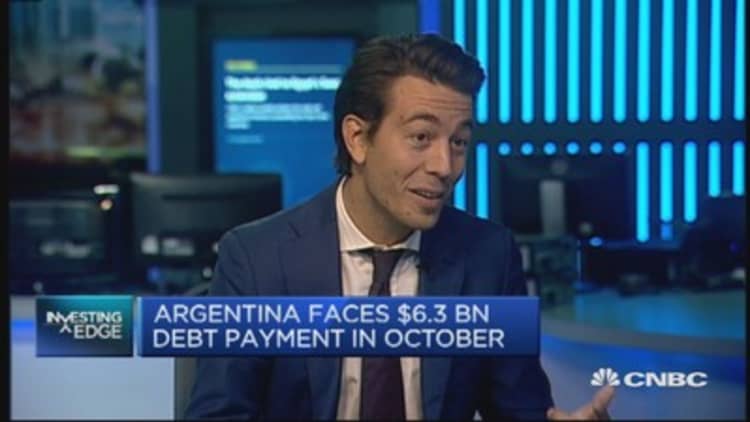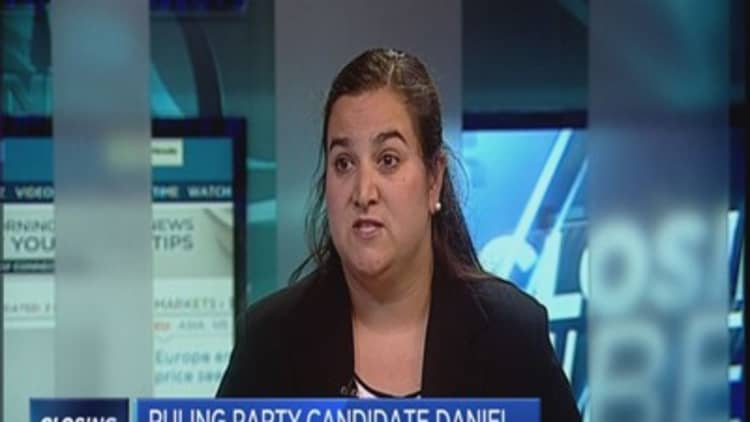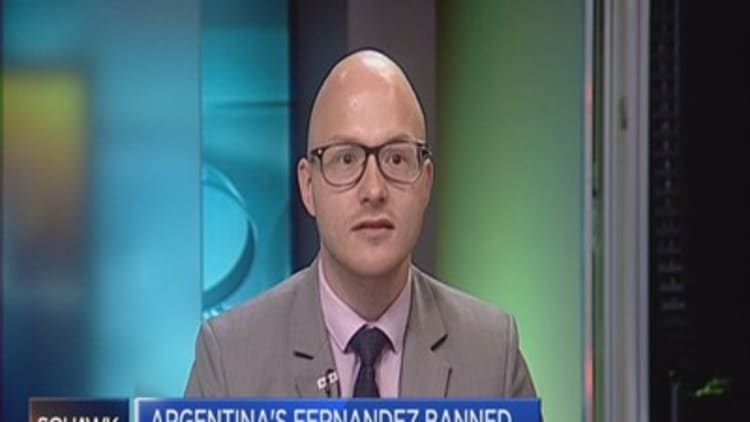


One debt-mired Socialist country may soon return to the capital markets, say analysts—but it's not Greece.
The primary ballot held on Sunday in Argentina indicated that this year's presidential election battle would be a tough one, with no clear winner in sight.
But irrespective of whether Argentina's leftist Front for Victory party remains in power or is replaced by the pro-business Cambiemos party, draconian capital controls may be scrapped.
"The interesting thing for us as investors is that you have two candidates who will have to bring Argentina back to international capital markets because they need to do it. The only question, are they going to do it fast or slowly?" Juan Sartori, president of Union Group, a private equity company focused on Latin America, told CNBC.
Argentina has remained largely barred from global capital markets following a massive debt default in 2002 and a subsequent one in 2014. A dispute with so-called holdout creditors still has not been solved, with billionaire hedge fund investor Paul Singer one of those chasing his dues.
Capital controls and trade restrictions introduced in December 2001 remain largely in place, with importers requiring authorization to purchases U.S. dollars, for instance.
Mauricio Macri of Cambiemos, who scored second in Sunday's poll, has pledged to swipe away the capital controls and trade restrictions on his first day in office, should he win in the presidential elections in October.
However, Sartori argued that even Daniel Scioli, the chosen successor of incumbent president Cristina Kirchner, would be forced to scale back on controls and try to regain the trust of investors.
Kirchner, who has led the country for eight years and taken an antagonistic line towards international business, is barred from running for a third term. She was preceded as president by her husband Nestor Kirchner, who led the country for four years.
It may seem that Argentina has little choice but to raise funds—thanks to limited financing options and sky-high inflation. Pressingly, in October—the same month Argentinians head to the polls—the country will face a $6.3 billion debt payment.
"We have no doubt that it (capital markets reopening) is going to happen, probably in a year or two years from now, whether because people want it or because the country needs it. Argentina needs foreign capital again," Sartori told CNBC.
When Argentina introduced capital controls in 2001, investors could withdraw only small amounts of cash on a weekly basis, with no withdrawals from U.S.-denominated accounts permitted. This paved the way for increasingly stricter controls, culminating in a forced currency conversion of 1 peso to the U.S. dollar in the private sector and 1.4 pesos to the dollar in the public sector and for dollar deposits.
Read MoreTrack Argentina's peso against the dollar
Some control measures were later challenged in court and revoked or loosened.
Argentina's gross domestic product (GDP) growth shrunk to 0.5 percent in 2014 compared to 2.9 percent the year before, according to the World Bank. The country suffers from one of the highest inflation rates in the world: PwC forecast on Monday that Argentine prices would rise by an average of 20 percent in 2015 and 25 percent in 2016.
"We have to keep in mind that Argentina's current economic imbalances mean that whoever wins will have to tread a very fine line between reforming the country and not throwing the country into recession. So I think that even an opposition win will mean a very slow pace for Argentine reform, but a lot of hope for potential investors," Jimena Blanco, principal Latin America analyst at Verisk Maplecroft, told CNBC on Monday.
Read MoreTrack Argentina's 10-year bonds
Sartori himself was optimistic about investment opportunities.
"When they open up… this injection of foreign capital after 10 years of being completely barred from the global economy is going to have a positive impact," he told CNBC.
"So we have been historically very pessimistic over Argentina. We don't have a dollar invested in that country. We are slowly changing our view."
The appeal of Argentina for risk-taking investors is clear—the benchmark Argentine Merval stock index has gained nearly 40 percent year-to-date, while the Argentine peso is up nearly 8 percent against the U.S. dollar.
"Spreads have come in… equities have also rallied," Maarten-Jan Bakkum, emerging markets strategist at ING, told CNBC on Monday.
"If you want to take some risk you can try to play Argentina."
—By CNBC's Katy Barnato. Follow her @KatyBarnato.

